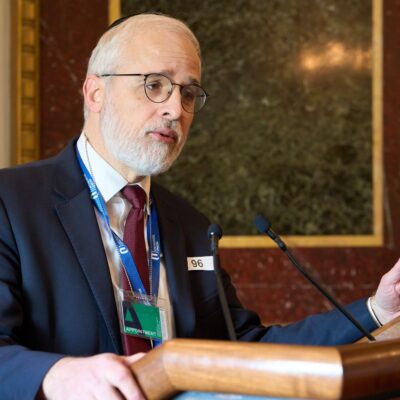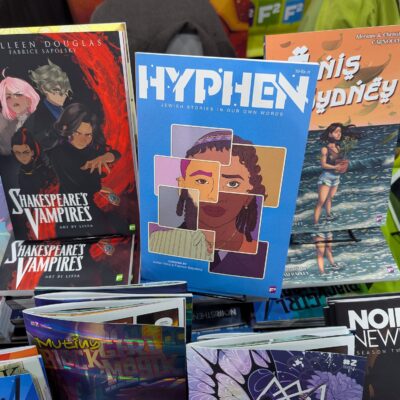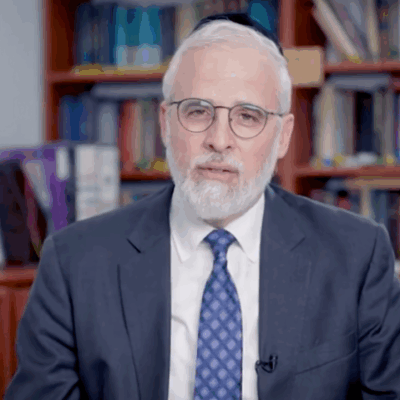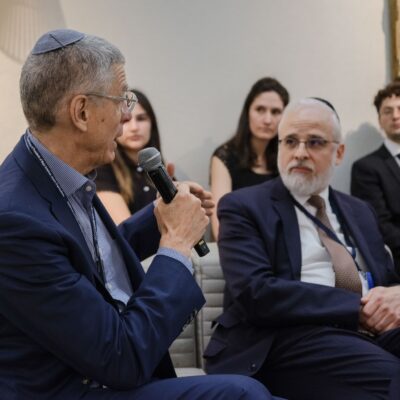Torah-on-the-Go!
[This post is part of a series updating the award recipient projects of the Jewish New Media Innovation Fund.]

by Russel Neiss
Last year, with the generous support of the Jewish New Media Innovation Fund, we began development of PocketTorah, a mobile application and website, with the goal of providing anyone the ability to learn the weekly Torah and Haftarah portion anywhere, at any time, on any mobile device or computer for free.
We released our Trope training app a few weeks ago, but today, after 150 hours of coding, 31.7 hours of recorded audio, three pre-alpha releases, and more all-nighters than we’d like to admit, we are happy to announce that the completed version of the app has been uploaded to the Apple Store and Android Marketplace, where they are available for free. In addition to the versions created for iPad, iPhone, iPod and Android devices, we have also released a web version of the application that can be viewed in Safari on any desktop or laptop computer. This means that in addition to being in your pocket, PocketTorah can be used in classrooms, on interactive whiteboards and with any other computer or device that is capable of running the web browser.
The full application includes:
- The entire text of the Torah and Haftarah in Hebrew and translation.
- On Demand Audio – With a simple click or touch of any Hebrew verse, the proper trope is chanted while the corresponding text is highlighted.
- Tikkun View – With the simple swipe of a finger, users can choose whether they want to see the Hebrew as vowelized, text or as it appears in the Torah with crowns and without vowels; and
- A Commentary Module that contains various commentaries from JTS, HUC, the OU, Torah.org and others.
But that is not all. We are not only releasing the completed app for free, we are also releasing all of the creative content. The audio files and their corresponding meta-data are being released under a Creative Commons Attribution-ShareAlike license, and the source code for the project will be released under the GNU GPL3. This means that anyone can take these files, and remix, tweak and build upon them so long you credit PocketTorah and license your new creations under the same identical terms. This will give coders, artists, educators and others the opportunity to take our work and build upon it, rather than having to simply start from scratch if they want to achieve something similar.
We are doing this because we care about Jewish learning. But we also hope that a side effect of creating a tool that gives Jews the ability to interact with their sacred texts will simultaneously demonstrate the viability open-source Jewish software development.
Our hope for PocketTorah is that it will be used in a variety of ways by a diverse set of populations. We hope that independent minyanim, Hillels and congregations will use it as a tool to expand the number of Torah readers in their ranks. We hope bar and bat mitzvah students will use it to help perfect their synagogue skills as they approach adulthood. But most importantly, we hope Jews who would have never before thought of reading from our sacred texts will be empowered and inspired to do so.
So if you have an iOS or Android device, download the apps; if not, play with PocketTorah in your web browser. And please let us know what you think, if you find any bugs or if you use our creative content in any interesting ways.
We look forward to seeing what you make.
PocketTorah is a project of Not-a-Box Media Lab, an educational technology venture that seeks to raise the quality of Jewish learning by offering easy access to 21st century multimedia technologies. Founded in 2009 by Charlie Schwartz and Russel Neiss, when they launched MediaMidrash.org, Not-a-Box Media Lab is rapidly expanding its projects and vision for the future of Jewish living and learning. Find out more about us, our projects and our vision at notaboxmedialab.com
Pocket Torah is a 2011-2012 recipient of the Jewish New Media Innovation Fund, a pilot collaboration of the Jim Joseph Foundation, Righteous Persons Foundation, and Charles and Lynn Schusterman Family Foundation that supported projects offering innovative ways of using new media to encourage the next generation of Jews to engage in life and community Jewishly.

 Add EJP on Google
Add EJP on Google








